Archive for November 5th, 2012
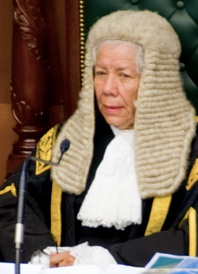
Speaker gets in procedural muddle over motion
 (CNS): The Legislative Assembly's speaker left a motion floating on the floor of the country's parliament on Monday after getting into another procedural muddle. This time, however, her predecessor was in the House to witness the mistake and point out the possible consequences such errors by the current speaker could have as her decisions are subject to judicial review. In accordance with Standing Orders, North Side MLA Ezzard Miller moved a motion to reject a statement by the premier in order to facilitate a debate on its content. But the speaker seemed unsure of the rules and opted to ignore the independent member's motion, which had been seconded by the opposition leader.
(CNS): The Legislative Assembly's speaker left a motion floating on the floor of the country's parliament on Monday after getting into another procedural muddle. This time, however, her predecessor was in the House to witness the mistake and point out the possible consequences such errors by the current speaker could have as her decisions are subject to judicial review. In accordance with Standing Orders, North Side MLA Ezzard Miller moved a motion to reject a statement by the premier in order to facilitate a debate on its content. But the speaker seemed unsure of the rules and opted to ignore the independent member's motion, which had been seconded by the opposition leader.
Following a statement by McKeeva Bush regarding his latest disagreements with London over the transposition of the Framework for Fiscal Responsibility into local law and the talks with CHEC on the proposed cruise berthing project in George Town, the opposition leader asked the speaker if members could pose a number of questions to the premier about the statement.
Although Mary Lawrence was unaware of the letter from Simmonds on which the premier’s statement was based, even though it was widely published in all the media and sent to most senior government officials at the weekend, she allowed the request for a limited period.
However, after the opposition leader, the PPM representative for Bodden Town and the newly independent member for East End had put the premier on the spot about CHEC, the FFR and the chain of correspondence with the UK, the speaker closed down the questions before the North Side MLA had any opportunity to ask his own.
As a result, Miller moved a motion, in accordance with the parliamentary rule book, for the LA to reject the premier’s statement and force a debate, which, given the importance of the issue the premier was speaking on, would have provided an opportunity for all members in government and opposition alike to have a say and ask the necessary questions.
Unsure of the move by the MLA and in an obvious state of confusion, the speaker said she had already closed down the subject and ordered that the House move onto the next item on the business paper. The speaker seemed unaware that she had to make a decision regarding Miller's motion and could not simply ignore it.
Following the adjournment, the former speaker and Lawrence's immediate predecessor, Edna Moyle, pointed out that the move was a significant mistake. Moyle, who was speaker from 2005 until 2009, explained that it is not possible to have two pieces of business on the floor of the parliamentary chamber at the same time. Moyle said that the speaker had a choice to either allow the debate or to persuade Miller to withdraw his motion.
However, the speaker did neither and told both Miller and the member for East End to sit down as they attempted to point out her error.
“The speaker cannot allow a motion to remain on the floor of the House without addressing it,” Moyle said. “It was wrong for the speaker to instruct the clerk to move the proceedings along without dealing with what was a legitimate motion on the floor as there simply cannot be two pieces of business on the floor at the same time.”
Moyle noted that the Legislative Assembly was subject to judicial review and such decisions could be challenged in the courts if members felt that their democratic rights were being undermined.
After being shut down yet again, despite his continued efforts to use the country's parliament to probe the actions of government and hold it to account, Miller said that he did not think he would be taking any legal action. “I won't be pursuing such redress but this latest incident just serves to remind us of the incompetence which is associated with every aspect of the current government,” the independent member said.
Throughout the the current parliament, which has been presided over by Lawrence, the first speaker appointed to the post who has neither served nor worked in the Legislative Assembly, the opposition has been at odds with the LA's 'referee', and sometimes even the premier, who appointed her, has disagreed with her decisions.
Both sides have questioned the decisions she has made regarding Standing Orders, which the members have often had to correct. In addition, the opposition has persistently complained about her attempts to curb the debate that takes place in the House.
The speaker’s post is one of the most senior public sector positions in the Cayman Islands and commands a six figure salary. The primary role of the speaker is to facilitate government business while ensuring that backbenchers and the minority members have an opportunity to question the government on its bills and policies. The speaker should rule only on the basis of Cayman’s Legislative Assembly Standing orders and when that rule book is silent on an issue, in accordance with Erskine May, the UK’s parliamentary handbook.
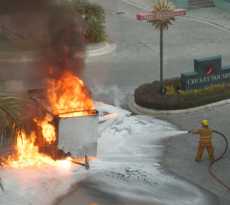
Trailer blaze causes rush hour traffic jams
 (CNS): A fire which broke out in a trailer on Elgin Avenue at the entrance to Cricket Square around 8.00am this morning caused traffic tailbacks and congestion during the morning commute. Police said that they had received a report that a trailer that was being towed by an Isuzu truck along Elgin Avenue towards Thomas Russell Way had caught fire. Emergency services attended the scene and the fire was extinguished. No-one was injured and no damage was caused to any property other than the trailer, a police spokesperson confirmed. (Photos: left by Mike Rhynold, below by Monique McLaughlin)
(CNS): A fire which broke out in a trailer on Elgin Avenue at the entrance to Cricket Square around 8.00am this morning caused traffic tailbacks and congestion during the morning commute. Police said that they had received a report that a trailer that was being towed by an Isuzu truck along Elgin Avenue towards Thomas Russell Way had caught fire. Emergency services attended the scene and the fire was extinguished. No-one was injured and no damage was caused to any property other than the trailer, a police spokesperson confirmed. (Photos: left by Mike Rhynold, below by Monique McLaughlin)
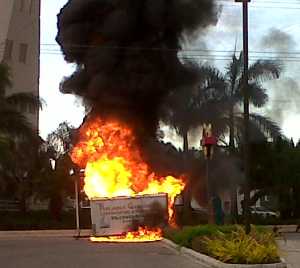
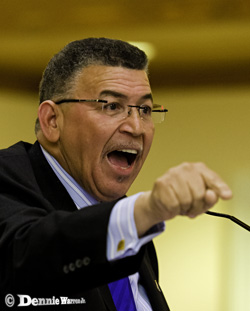
Mac digs in heels with UK
 (CNS): Despite the unequivocal position of the UK on the need to transpose the Framework for Fiscal Responsibility into law as it was signed last November, as well as the need to change tack over the proposed cruise port, the premier made it clear Monday that he was going ahead with his amendments to the FFR and his partnership with CHEC. In a statement delivered in the Legislative Assembly he told the parliament that he had instructed the government’s lawyers on the deal, Maples and Calder, as well as the accountants KPMG to send the full details to the UK about the proposal to reassure the minister that it met the criteria of value for money. He also said that if the UK was, as it claimed, a reasonable partner, it could not object to the changes he had made to the FFR bill.
(CNS): Despite the unequivocal position of the UK on the need to transpose the Framework for Fiscal Responsibility into law as it was signed last November, as well as the need to change tack over the proposed cruise port, the premier made it clear Monday that he was going ahead with his amendments to the FFR and his partnership with CHEC. In a statement delivered in the Legislative Assembly he told the parliament that he had instructed the government’s lawyers on the deal, Maples and Calder, as well as the accountants KPMG to send the full details to the UK about the proposal to reassure the minister that it met the criteria of value for money. He also said that if the UK was, as it claimed, a reasonable partner, it could not object to the changes he had made to the FFR bill.
McKeeva Bush said he did not believe that the UK's overseas territories minister, Mark Simmonds, was aware of all the facts regarding the port, but once he was, Bush said he felt sure he would support the project.
“It would appear to me that the honorable minister was not provided with the full facts and circumstances in relations to a number of important matters which are briefly and un-specifically referred to in his letter,” Bush said regarding the correspondence from London, which makes it clear that the UK minister is taking the same position as his predecessor regarding the cruise berthing project.
Bush also took aim at Opposition Leader Alden McLaughlin and blamed him for the position that his government found itself in regarding the UK, and said he had signed the FFR under duress in order to get a budget.
In a long statement that triggered many questions from the opposition benches, Bush made it clear he was digging in his heels over the way that he intended to progress with the port and the FFR, and if the UK insisted on stopping him then he would have at least tried to do what he thought was best for the Cayman people.
Bush insisted, however, that once Simmonds was in possession of all the facts regarding the proposed CHEC deal he would see that it met all of the criteria the UK wanted to see, including transparency and value for money.
He said that Simmonds would get “a full and comprehensive outline of the processes which are being carried out and the process for the ascertainment of good value for money.” The CHEC talks, he stated, were following international best practice in regards to procurement.
After the talks were complete, the project proposal would go to the Central Tenders Committee before it was signed off, Bush said, adding that if the deal was not going to be value for money, government would not progress.
“The minister's concerns, as expressed in his letter, in relations to this project appear to have arisen from a lack of correct and factual information being provided to him in a timely manner, despite our best efforts to keep the FCO informed,” Bush told the Legislative Assembly members. “The instructions to Maples and to KPMG will correct this and will be delivered directly to the Minister.”
Bush said it was his understanding that CHEC had been one of the original respondents to the expression of interest circulated by government in 2009, a claim which has always been refuted by the former port authority board chair and others close to the talks.
Pressed by the opposition benches to demonstrate that with documentation or to even ask the third elected member for West Bay, who was sitting right behind him, if CHEC was one of the original bidders, the premier fudged his response, stating that all he knew was that CHEC had come into the process at some point. But he pressed his position that whenever it was that they became involved, the Chinese were offering the best deal for Cayman.
Bush made it clear that as well as pressing ahead with the talks he would be making the two changes to the FFR regardless of the UK position as he insisted he was honouring his commitments.
He accused the opposition leader of attemptingto make political capital out of the situation and “fill his bandwagon with candidates”, as he suggested the PPM's fortunes regarding the election were not looking good on account of the growing number of independents threatening to run in the May General Election.
“There are more independents out there than there are people,” Bush said. He also berated McLaughlin for trying to stir up civil unrest.
He said it was McLaughlin's fault that the UK “have us this way”, as he insisted that if the British government was a reasonable partner, it should be willing to take responsibility for any loss of revenue or reputational damage Cayman suffered because of the FFR.
Bush said he felt it was his job to press the UK into being accountable for what they were making his government do. He said the UK should "be able to agree that they are reasonable” but he said the minister's letter “does not provide any specific reasoning as to why these provisions may not be acceptable.”
Bush added that while the FCO minister had accused him of disregarding good governance and being "in breach of a series of commitments”, he had not said what those commitments were, and while he assumed he was referring to the changes in the FFR, Bush said that, in his opinion, they do accord with good governance.
The premier said the most important thing for him was Cayman and the Caymanian people. He claimed he was not interested in the election but said he was pressing ahead in order to help his people who were suffering and to create much needed jobs.
Vote in CNS Poll: Should-Mckeeva-Bush-resign-now?
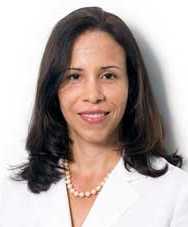
Pilar sacked from CAL board
 (CNS): Despite the failure of any government official to officially inform Pilar Bush that she has been sacked from the Cayman Airways board, the chief officer in the tourism ministry confirmed Monday that Philip Rankin has been given the chairmanship of the airline’s board of directors. The former chair, who has also held the post of deputy chair, told CNS Monday that although she was well aware of her removal, she had received no correspondence from Premier McKeeva Bush or anyone in government informing her that she had not only been replaced as chair but completely ousted from the board.
(CNS): Despite the failure of any government official to officially inform Pilar Bush that she has been sacked from the Cayman Airways board, the chief officer in the tourism ministry confirmed Monday that Philip Rankin has been given the chairmanship of the airline’s board of directors. The former chair, who has also held the post of deputy chair, told CNS Monday that although she was well aware of her removal, she had received no correspondence from Premier McKeeva Bush or anyone in government informing her that she had not only been replaced as chair but completely ousted from the board.
“I have yet to receive any official communication from the premier, the ministry or Cabinet, but I was made aware of my replacement as chair and my former position of deputy chair last week,” Pilar Bush said. “On same day I advised the rest of the board and removed myself from any CAL related matters. This approach to managing boards is characteristic of Mr Bush and although it is disappointing it is not surprising and a consequence when people disagree with the premier.”
While Rankin is now chair of the national flag carrier’s board, sitting members George Hunter and Anthony Akiwumi have been appointed deputies and Rafael Elias, a local Chartered Accountant, has been appointed as a new Member of the Board.
“The Ministry congratulates the new and sitting Members of the Board and applauds their willingness to serve in their new respective capacities,” a release from the ministry’s Chief Officer Stran Bodden stated.
There were no thanks or comments regarding the removal of Bush, who has served for the past three years.
Although the reasons for Pilar Bush’s removal have not been confirmed, sources close to the issue stated that she had given advice to Cabinet regarding the MOU which the premier signed while in Manila with San Miguel, the company which owns a major share in Philippines Airlines.
Related article on CNS Business:
Mac signs deal in Manila (31 October 2012)
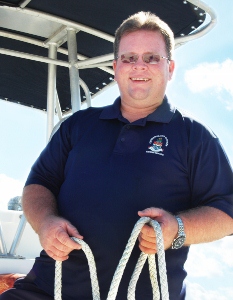
Ocean guardian earns CS accolade
 (CNS): The sterling efforts of Mark Orr who has for years done his absolute best in the face of dwindling resources to protect Cayman’s marine life have been recognised publicly by his bosses. Orr is the latest CIG Employee of the Month who has not only been lauded for his efforts but has received a well-deserved cash bonus as well. “The best value-for-money within government” is how his bosses described him last week when Franz Manderson, the deputy governor presented him with the award for September. Orr who is the Chief Conservation Officer at the Department of Environment (DoE) said his efforts were all about teamwork.
(CNS): The sterling efforts of Mark Orr who has for years done his absolute best in the face of dwindling resources to protect Cayman’s marine life have been recognised publicly by his bosses. Orr is the latest CIG Employee of the Month who has not only been lauded for his efforts but has received a well-deserved cash bonus as well. “The best value-for-money within government” is how his bosses described him last week when Franz Manderson, the deputy governor presented him with the award for September. Orr who is the Chief Conservation Officer at the Department of Environment (DoE) said his efforts were all about teamwork.
Manderson commended Mr Orr, who is also the head of the DOE enforcement arm, for his sense of dedication and commitment. “I fully understand the risks and rewards of wearing an enforcement uniform, as this was the foundation of my civil service career,” Manderson said.
This was the second CIG Employee of the Month presentation and Orr’s commitment to the job and work ethic were praised extensively in his nomination form which also describes him as a true conservationist. It went on to say that “he is available for any disaster: including conservation violations, pollution incidents, as well as search and rescue; and he responds at any hour and in any weather”.
Some of the Chief Conservation Officer’s recent work has included dealing with the issue of captive stingrays, the protection of nesting sea turtles and the hazards posed to unwary swimmers by the lone wild dolphin.
The form states that “Mark is driven by the belief that his work makes a difference’ and that he “clearly stands highest in devotion to duty”.
The Deputy Governor’s Award programme was developed to recognise civil servants who exceed expectations. Every 12 months the Deputy Governor will select a winner from among individuals who have received the CIG Employee of the Month award over the past year. The awards serve to reinforce and encourage the high standards which are expected from all Cayman Islands civil servants.
The other September awardees were Michelle Connolly-Rivers, Sophia Chandler, Sherilyn Eden and Brian Crichlow.
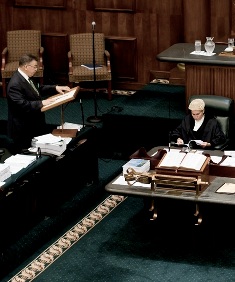
LA returns to face crisis and TV audience
 (CNS): The country’s elected officials will return to the Legislative Assembly this morning (Monday 5 November) in the face of another crisis regarding its relationship with the UK. This time, however, the issue has nothing to do with espionage or police investigations but a matter of the premier’s refusal to bow to the UK’s insistence on good governance. The legislators will be facing a packed agenda, from laws to ensure government can collect the necessary cash to meet this year’s record breaking operational revenue target to how Cayman will vote at the next election. In addition, although there has been no confirmation yet, the much anticipated plan to televise the proceedings is expected to begin today.
(CNS): The country’s elected officials will return to the Legislative Assembly this morning (Monday 5 November) in the face of another crisis regarding its relationship with the UK. This time, however, the issue has nothing to do with espionage or police investigations but a matter of the premier’s refusal to bow to the UK’s insistence on good governance. The legislators will be facing a packed agenda, from laws to ensure government can collect the necessary cash to meet this year’s record breaking operational revenue target to how Cayman will vote at the next election. In addition, although there has been no confirmation yet, the much anticipated plan to televise the proceedings is expected to begin today.
Although government has had plans for some time to televise the LA on its own government channel and while cameras are now installed in the chamber, it is not yet known if Monday will mark the inaugural broadcast of the country’s parliament. If so, government intends to broadcast the LA sessions live and to repeat the proceedings at various intervals. Bush has said he invested in the government TV, despite already having a regular government TV show produced by Government Information Services (GIS), to provide government with a means of getting its message out to the people without the filter of the local press, which he has frequently accused of spinning his message.
Viewers tuning in or turning up for the live proceedings can expect a packed legislative session. Along with a number of bills carrying over from the last session, there are more new bills to be dealt with, as well as the crisis over the Framework for Fiscal Responsibility and the cruise berthing facilities.
During this forthcoming meeting, which is expected to last until the Overseas Territories Consultative Council meeting next month, government will also need to address how three extra seats will be added to the LA at the next election before the governor issues the writs of election in mid-December. With time running out, the premier is expected to stick with his original plan of adding two seats to George Town and one to Bodden Town as it is understood he has abandoned the idea of nine two-member constituencies.
There are also many annual reports from government departments to be made public during this meeting, as well as an expectation that the premier will be making announcements to update the country on his recent travels to Asia and an agreement he signed there with a Philippines company, in addition to the need to address the conflicting messages coming out about the proposed airport development. Bush may also speak about the situation regarding the ForCayman Investment Alliance.
It is very likely, however, that the premier will be forced to address the UK’s warnings about the FFR and the government’s position on the cruise berthing project now that Mark Simmonds, the FCO ‘s overseas territoriesminister, has made it clear that Bush cannot go ahead with that proposal as it currently stands.
What could be a lively session of the country’s parliament is due to start at 10am.

‘Mac, resign now!’ says Miller
 (CNS): In the wake of the letter from the UK’s overseas territories minister to the Cayman Islands premier about his defiance regarding issues relating to good governance, MLA Ezzard Miller has once again called on McKeeva Bush to resign from the post of premier. The independent member said at the weekend that if he stubbornly insists on remaining in office, the UDP party machinery must force him to step down in order to save the Cayman Islands for the very real danger of the UK imposing direct rule. Miller said the country could not allow just one man to be the cause of such drastic intervention when most of the country supported the goal of good governance.
(CNS): In the wake of the letter from the UK’s overseas territories minister to the Cayman Islands premier about his defiance regarding issues relating to good governance, MLA Ezzard Miller has once again called on McKeeva Bush to resign from the post of premier. The independent member said at the weekend that if he stubbornly insists on remaining in office, the UDP party machinery must force him to step down in order to save the Cayman Islands for the very real danger of the UK imposing direct rule. Miller said the country could not allow just one man to be the cause of such drastic intervention when most of the country supported the goal of good governance.
Miller said that the 2 November letter from Mark Simmonds, the FCO minister, instructing Bush to transpose the Framework for Fiscal Responsibility into law and to halt the talks with the Chinese over the cruise berthing facilities was unequivocal in its message.
“I’ve never seen such a strongly worded letter when it comes to diplomacy,” Miller said, as he pointed to the use of the word “unacceptable” and the less than veiled threats in the correspondence about the alternatives being examined by the UK.
Miller said the letter that Bush had reportedly sent on 30 October to the FCO, which never reached the minister, was extremely worrying as it showed the premier has no intentions of following the UK’s request regarding these commitments to good governance that the premier had previously agreed to.
The independent member said he has already prepared a committee stage amendment, which he hopes the Speaker will accept ahead of the start of the resumption of the Legislative Assembly. The amendment seeks to bring the FFR Bill that the premier has now sent to the LA back in line with the agreement Bush signed with the UK. Miller said that if government did not accept this he would be forced to vote against the law.
“Bush is playing politics but dangerously so, as he is hoping to drive the independent and opposition members to vote against his bill by adding these clauses when we all support the agreement, which is about protecting public finances,” he said. “But I can’t support the changes the premier has made.”
He pointed to the pointlessness of the premier bringing down a law to the parliament that the governor will refuse to sign and of the very dangerous game Bush was playing with the UK.
“Bush must do the country a favour and resign now,” he said. “If he won’t, I call on Sherri Bodden-Cowan, if she is still the United Democratic Party secretary, to have the members remove him as leader of the party and subsequently the premiership.”
Miller warned that if Bush did not resign or get ousted from office, Cayman was at risk of the same fate as TCI and the people could not let that happen because of just one man.
“McKeeva Bush cannot be so important that he could be allowed to bring down our democracy and ruin our country. It would take us years and years to recover from such a drastic step. He has to be stopped,” Miller added.
Vote in the CNS poll: Should McKeeva Bush resign now?
Related article (with FFR attached):
CIG has 4 years to sort debt (27 November 2011)

In the hands of voters
With the US Presidential election dominating much of the media coverage, our thoughts, business conversations and even the late night comedy shows these days, it can serve us in the Cayman Islands as a window through which to look at our own upcoming election in May 2013.
In the US, some political pundits have distilled the very close race to two issues symbolized by two different men – an appreciation for the pervasive social issues represented by Obama and an aggressive focus on the economic recovery represented by Romney. Some say the dividing line will be which of these two issues are deemed more important and more urgent by more voters.
Which brings us to the Cayman context – what will be the deciding factors in our election? Just like the United States, we have our fair share of economic challenges and social problems. They are both important and both urgently in need of effective solutions. How do we decide who to elect?
We have just over 6 months to clarify in our minds and as a country what are the most important things we want from the next Government. We need to look ahead and picture the type of Caymanian society we want to be living in 2017 and beyond, then set out our expectations of what the next Government and leadership should look like to help create this vision of Cayman. Unless we are honest with ourselves, set realistic expectations and are prepared to work to achieve these goals, we will continue to get the substandard to mediocre representation we have had in successive Governments and quite likely slide into the realms of a third world country that was once great, like many of our regional neighbors.
How do we the people, the voters, ensure we get from here at the end of 2012 to where we want to be in 2017?
Let us start by being accountable and honest about our people, the state of the country and our leaders. The myriad of issues and challenges we face as a country have been created or facilitated by Caymanians, and our own people have held the positions, the power and the decision making ability by their role on various Government appointed boards, top Civil Service positions and, in particular, those elected to the Legislative Assembly.
All who have served in these various roles had position, power and decision making abilities which could have been used to prevent or at least address these problems. Yet, these same leaders over the past 12-15 years frequently chose political expedience, popularity and the bartering of business favours over doing the right thing for Caymanians. Sometimes the wrong thing was done simply to satisfy someone’s ego and good people within the system failed to stand up for the right thing.
The 2013 election is our best opportunity to take definitive action and put our country back on the right course. Today, we must challenge ourselves and our leaders with an old Caymanian saying “If you KNOW better, DO better”.
How do we as a country DO better?
First, set goals. Be clear on what we want. Keep this simple but pragmatic. Let’s consider three areas wherewe need to have clear goals and the aspiring politicians will need to demonstrate their plans to implement viable solutions.
Area #1 – The Caymanian Economy:
We should want a stronger economy where Caymanians are able to participate and benefit from this economic miracle without being made to feel like beggars in their own country. Markers of an improved economy will include a healthy and sustainable Government budget, reduced taxes and fees, near zero unemployment of Caymanians, strong economic sectors such as financial services, tourism, commerce and development, a high confidence level in the jurisdiction which acts to stabilize the economy both from within and from those outside looking in. We should want a country where new business opportunities are available to ‘indigenous’ Caymanians and not just the 'new' Caymanians who leverage an expatriate network to help themselves and their own friends and family at the direct exclusion of existing Caymanian businesses or aspiring entrepreneurs.
Area #2 – Employment (Education & Training):
In order for us to have Caymanians participating in a healthy economy, regardless of the social status or current economic means, we need to have an education and training system which is designed to create competent, capable and ready to work Caymanians – whether they want to be a professional accountant or a professional janitor. We need equal focus on education as on training. The education needs to be more than the physical buildings and facilities.
We need a country where the education and adult training programmes provide the tools, teaching, quality teachers and support systems to allow people to achieve their highest potential. Training programmes in particular need to be effective and accessible, and work to make sure our people are employable and able to advance in their chosen area of work. These training programmes cannot leave a generation behind, they MUST be geared to help working adults who are struggling financially with families and yet want to access necessary skills improvement and training. These training programmes must be designed to produce successes and reinforced by supporting Immigration, Labour and Employment policies across the entire Government.
Area #3 – A healthy, harmonious Caymanian society:
The single most important goal we ought to have for our country is that of a healthy society, with harmony, mutual respect and full integration of the expatriates and new Caymanians into the Caymanian way of life, culture and communities. This is very important to all of us – that expatriates are integrated into our society and not the other way around – because that is what every other developed country in the world does as it welcomes immigrants from all walks of life, whether doctors or janitors.
Expecting expatriates to integrate into our society is to seek harmony and mutual respect; being pro-Caymanian is a transparent nationalist view similar to how Americans, Canadians, British, Brazilians, Singaporeans and Germans feel about their own country. Today, being pro-Caymanian is met with suspicion and interpreted as being “xenophobic” – that is just the result of generations of Caymanians who have been told to keep quiet and take whatever they are handed down by successive Governments and business leaders who have regularly taken advantage of our traditionally humble demeanor, quiet nature and naiveté.
After the social failings of the past 25 years by some of the same political players and policy makers seeking re-election in 2013, the new Caymanian society must be Caymanian first and by that, all those who chose to move here to live, work and even seek permanent residence must adopt the paradigm that Cayman is a place to respect, value and preserve the very things* that attracted you here in the first place. In my mind that is best described as “Cayman for Caymanians and all who love it and choose to make it their home.”
The 2013 election is our best opportunity to take definitive action and put our country back on the right course. If you don’t know where you’re going, any road will take you there. This is why it is essential that first and foremost we are clear on what we want as a country.
Secondly, we need to leverage our individual power to bring about change by voting differently in 2013. Know the worth of your vote. We need to expect more and get more from those who want to lead.
Do not just give your vote away based on long term friendships, family loyalties or the promise of a handout. Do not allow anyone to insult your intelligence, pride and personal integrity with the usual handouts which pale in comparison to the personal perks, privileges and financial (not to mention the professional and commercial) rewards they are capable of reaping whilst in office.
Reserve your vote for those individuals who you feel have earned it based on their efforts, their performance in public, private and professional life AND how transparent and logically they explain to you how electing them will help the country and in so doing, improve the quality of your day to day life in the Cayman Islands. We have a real opportunity to bring an end to the cycle of the career politician who has received much over the years yet provided so little in return to help our country. If you have any doubts, the evidence of their track record is best illustrated in the current state of the country which is their collective legacy.
As voters, we need to stand united on our platform of better governance, better representation and accountability. Anybody who has not performed, who has failed to represent the people, their constituents and their legitimate concerns and who appeared to be avoiding accountability (particularly the members of Cabinet and former Ministers) and yet remained content to receive all the perks and hefty compensation have to be removed from office. We cannot afford any more free riders. Ask yourself the question “in four years what has the individual done to earn my confidence, support, respect and most importantly, my vote on Election Day?”
For those newcomers and would-be first time politicians, ask the same tough questions. While they may not have a record in public office, they have a responsibility to demonstrate to you their character, their track record of getting things done and doing the RIGHT things when they had an opportunity to do so. Aspiring leaders must demonstrate their past willingness to listen and be accountable; otherwise their claims will be no more than campaign rhetoric until they get elected.
Do not give your vote away based on personalities, empty promises or party loyalty. Treat your votes as one of your most valuable tools to get the type of Government you want and create the type of Cayman where we can feel confident, comfortable and proud to raise our families, run our businesses and invite visitors. Reserve your vote for the leaders who best PROVE to you that they have a plan which can be implemented whilst not bankrupting us either morally or financially.
Expect More from Candidates — it is the only way to get more from elected officials and from Government. Vote carefully. Your vote will determine how the Cayman Islands move forward in 2013. Will we advance the prosperity and peace through better Governance and Accountability? Or will we vote for parties, personalities and promises and propel ourselves into 4 more years of misery, divisiveness and creating an even greater disparity between the haves and have-nots in our tiny country.
All of our problems are fixable. Let’s work together to DO better now that we KNOW better.